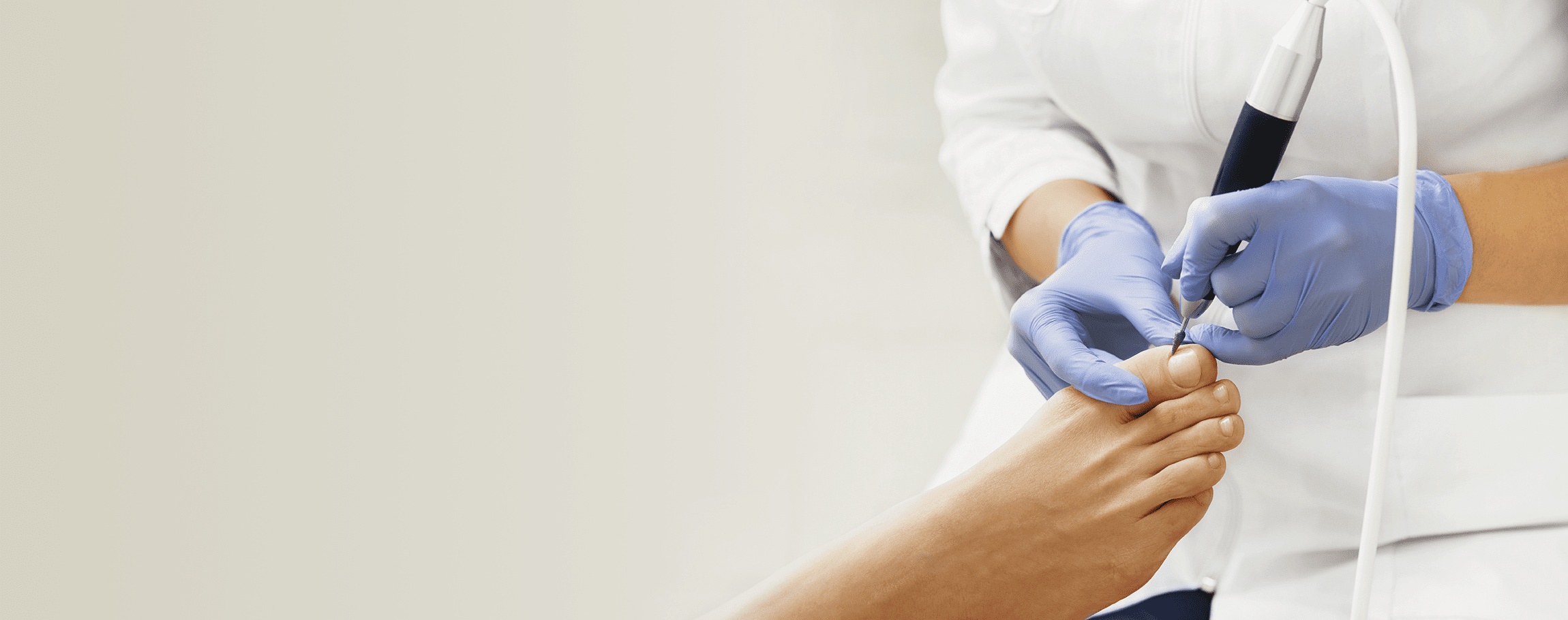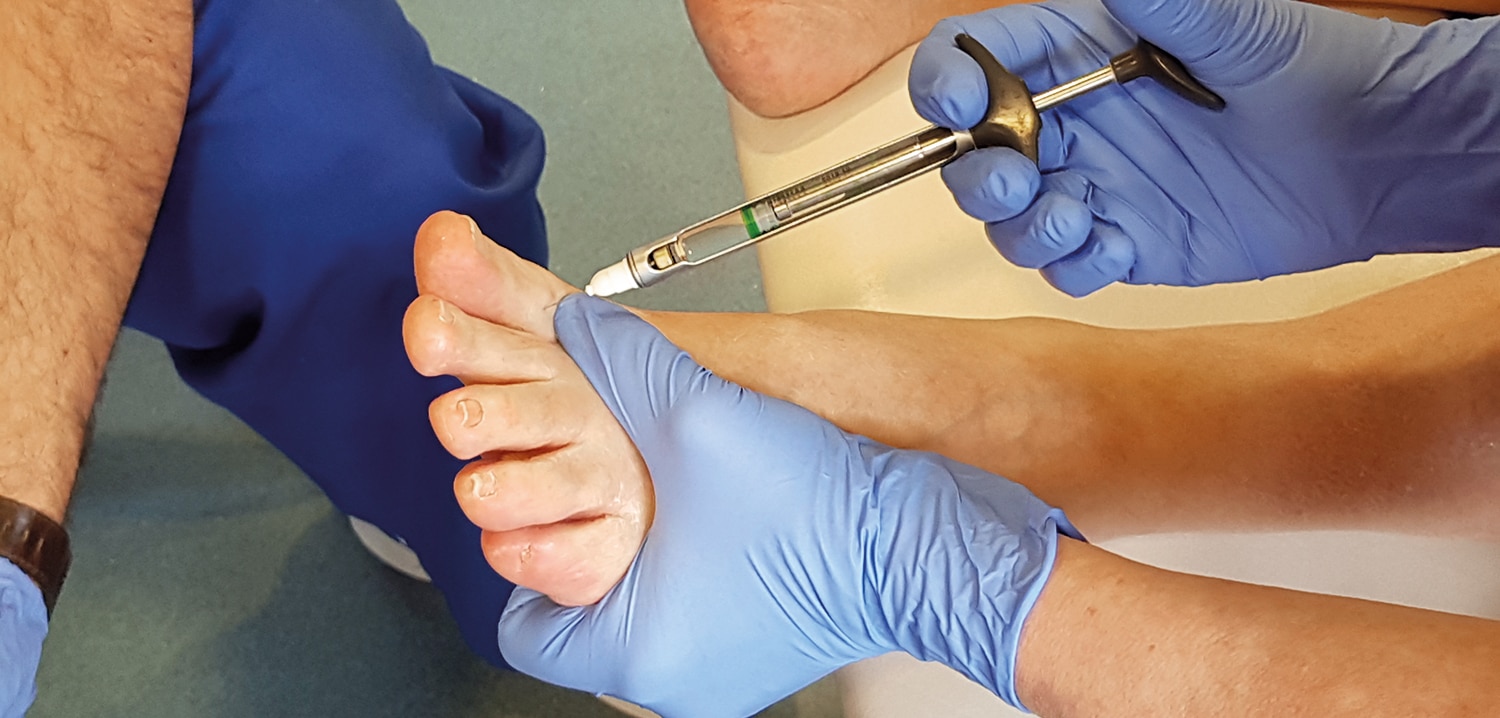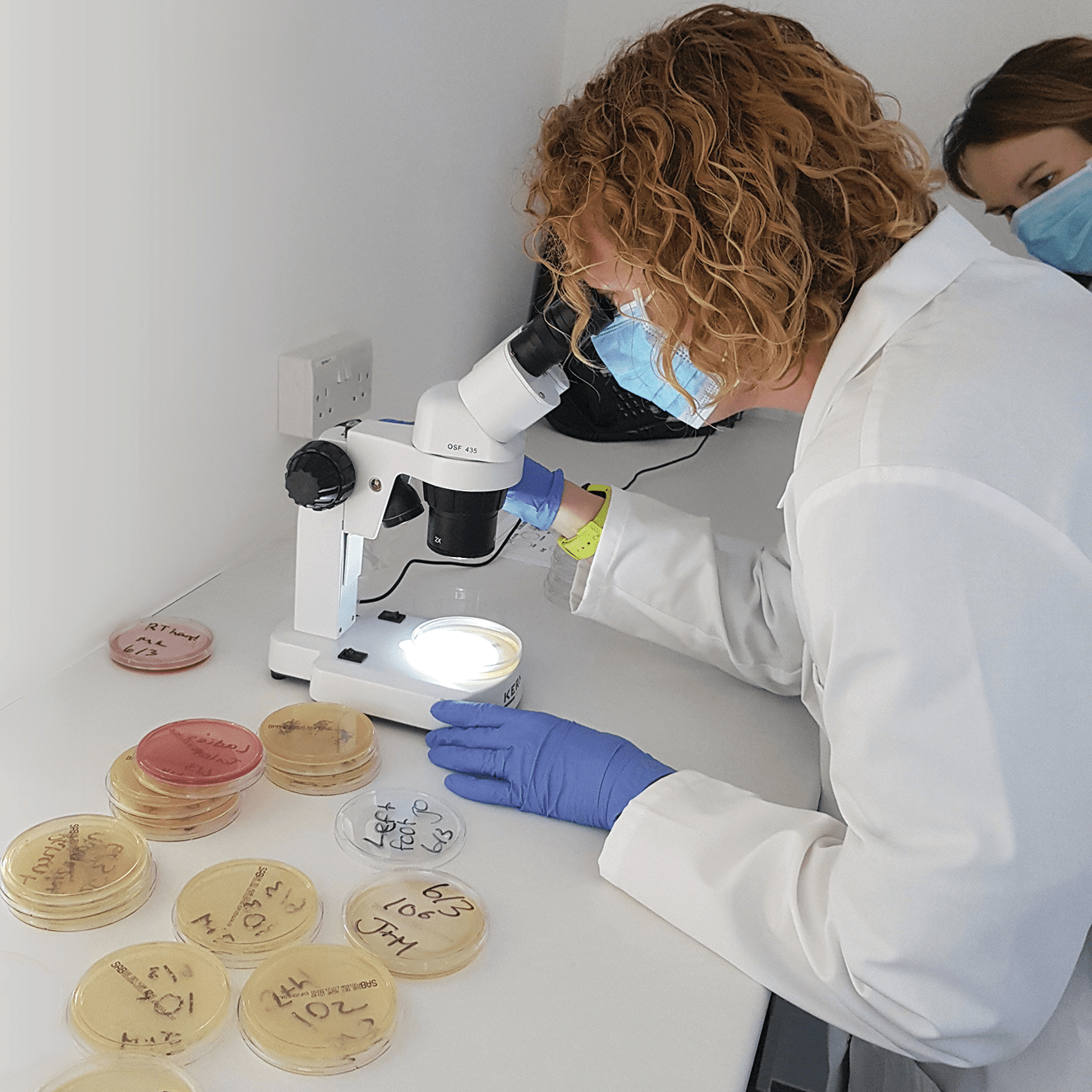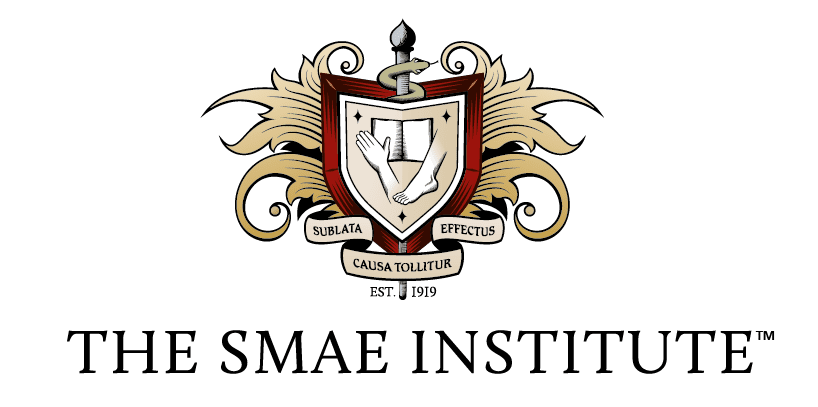

BSc (Hons) Podiatry
Four-year distance based, blended elearning honours degree
Course Overview
Duration: 4 years distance learning
Start Month: September
Format: Distance based, blended elearning
Fees: £3,999 per year (payment options available)
Awarding Body: QMU

About the course
The SMAE Institute, in collaboration with Queen Margaret University (QMU), is proud to introduce this four-year distance based, blended elearning BSc (Hons) Podiatry course. On this course you’ll gain the knowledge, practical skills and confidence that you’ll need to practise as a registered podiatrist in the private sector or NHS.
This is a four-year, distance learning honours degree, at levels 7-10 on the Scottish Credit Qualification Framework (SCQF), that is designed to enable those who have successfully completed the SMAE Institute Diploma in Foot Health, which is credit rated by QMU, to progress to eligibility to apply for HCPC Registration.
This course will not only develop you to the standard required for eligibility to apply for HCPC registration, but will also give you the skills, attributes, clinical experience, plus personal and professional confidence to be at the forefront of the profession and to become the future influencers, managers and leaders of the profession. This course aims to develop a podiatrist who is a patient focused practitioner, reflective in all aspects of practice, and proactively engaged with learning and professional development to enhance and advance both their individual practice and their profession.
Course Structure
This course is delivered via blended e-learning, which means as a student you would be working at a distance via the internet (utilising a Virtual Learning Environment (VLE)) as well as attending lectures, practical and clinical sessions at The SMAE Institute. In addition to this, students will also attend placements in the private and third sector. Whilst most content is delivered online, lecturers will guide you through your learning and provide one-on-one and small group support throughout. Each year students will be required to attend clinical training and/or placements, and schedules.
Teaching, learning and assessment
This is a distance-based, blended e-learning course that requires dedicated hours of study commensurate with full-time learning. Each module has dedicated weekly live tutor chat sessions with the designated module leader (tutor), who is also available via personal email and telephone at scheduled times. There is also administrative support staff available online and via telephone daily. The module forums are accessible for each module to provide a virtual classroom environment and will be accessed and supported by staff and tutors alike. The assessment method varies from module to module and the majority of the course will be distance learning with some compulsory attendance. The dates of attendance required are given to students at the beginning of the course so that they can plan ahead.
Whilst The SMAE Institute is the organisation delivering your study, on this course you will be also be a student of Queen Margaret University (QMU). As such you’ll be given access to their learning resources and have a QMU VLE (virtual learning environment) username and password.
Course Modules
YEAR ONE
| Module Name | Module Description |
|---|---|
| Clinical Studies 1 | This module is designed to enable the student to acquire the knowledge and skills necessary to investigate, diagnose and manage a range of common lower limb pathologies seen in low risk patients. |
| Locomotory Science and Anatomy – The Foot and Ankle | This module introduces the student to the mechanical principles that underpin gait analysis and explores in detail the structural anatomy of the lower limb, with particular emphasis on the ankle and foot. |
| Locomotory Science and Anatomy 2 – Normal Gait | This module explores in detail the structural anatomy of the lower limb, with particular emphasis on the leg, knee and thigh as well as the gait cycle and normal developmental variants. |
| Cell Biology, Physiology and Microbiology | This module enables students to develop an understanding of the role of Podiatry and other health disciplines in the context of cell biology, physiology and microbiology. There is a focus on the structure, function and neuro-humoral regulation of the endocrine system, and its relationship to other major physiological systems as well as developing knowledge and understanding of microbial growth and survival emphasising features relevant to interactions with humans and human health. |
| Evidence Based Healthcare - Sourcing and selecting literature to understand and inform research | This module develops student understanding of the use of research in evidence-based health care delivery; through guided exploration of the ways in which research informs development and implementation of guidelines for clinical practice. |
YEAR TWO
| Module Name | Module Description |
|---|---|
| Clinical Studies 2a | This module enables a student to develop an understanding of the underlying principles of pharmacological therapy and the rationale for treatment relating to the cardiovascular, autonomic and inflammatory response. It also develops a student’s theoretical knowledge and practical skills required to administer digital local analgesia (POM-A as per HCPC annotation). |
| Clinical Studies 2b | This module enables the student to investigate and diagnose a range of pathologies related to soft tissue and structural anomalies, and consider and demonstrate appropriate therapeutic regimes including the use of functional foot orthoses. |
| Pathophysiology | This module provides knowledge and understanding of the pathological processes relating to the systems covered in human physiology. It will introduce students to the concept of problem-based medicine and provide deeper understanding of physiological processes and the application to the clinical context. This module will also focus on the role of Podiatry within the broader context of multi-disciplinary care in managing patients with chronic and / or complex pathology. |
| Disorders and Management – Musculoskeletal conditions | The module provides the student with the necessary skills and knowledge base to diagnose and carry out effective management strategies for musculoskeletal conditions affecting the lower limb. |
| Professional Issues – Part 1 - Professionalism | This module prepares the student for registered practice as a Podiatrist by enabling them to critically examine and interpret the elements of professionalism within the contexts of delivering healthcare and podiatric practice. This will be considered against the backdrop of Interprofessional working. |
YEAR THREE
| Module Name | Module Description |
|---|---|
| Clinical Studies 3 | This module develops students skills in examination, evaluation and management of the ‘high risk’ lower limb by developing high level psychomotor skills and by developing skills to undertake evidence based podiatric practice (in particular developing familiarity with NICE and SIGN guidelines). This module also enables students to gain experience of utilising POM-A in using digital block analgesia, and undertaking nail surgery procedures. |
| Locomotory Science and Anatomy 3 – The hip, pelvis, nerve supply and pathological gait | This module explores the structural anatomy of the lower limb with particular emphasis on the hip, pelvis and the motor & cutaneous nerve supply to the lower limb and helps students to develop a knowledge base and the skills required to distinguish between normal gait changes across the life cycle and pathological gait. |
| Disorders and Management 3 | This module helps the student to develop a deep knowledge and understanding of the physical and psychosocial manifestation of systemic diseases related to Podiatric practice in association with relevant podiatric, pharmacological and surgical management through a problem based and shared learning approach. It further enables the student to critically analyse their own and other health professionals’ roles, expertise and perspectives in healthcare practice in the context of lower limb pathology as well as service users’ perspectives on self-care. |
| Disorders and Management 3 – Dermatology of the lower limb | This module provides consideration of the differential diagnosis, potential impact and management of cutaneous and systemic disorders and diseases on the skin of the lower limb. It further enables the student to critically analyse their own and others’ roles, expertise and perspectives in healthcare practice in the context of lower limb dermatology. |
| Evidence-based Healthcare – Appraising the Evidence | This module enables students to develop their understanding of the importance of appraising evidence and helps them to develop their ability to constructively appraise evidence and to construct a focussed literature review. |
YEAR FOUR
| Module Name | Module Description |
|---|---|
| Clinical Studies 4 | This module enables the student to fulfil the requirements for eligibility for HCPC registration by consolidating skills in examination, evaluation and management of the ‘high risk’ lower limb, to enable evidence-based practice. This module further helps the student to develop experience of new patient triage and referral, utilising POMS-S, psychomotor skills such as needling techniques, and anaesthetic techniques such as tibial block. |
| Disorders and Management 4 – Tissue Viability | This module enables the students to critically investigate/study the evidence base for factors contributing to cutaneous ulceration, and the effectiveness of current management practices. It further enables the students to critically analyse their own and other health professionals’ roles, expertise and perspectives in healthcare practice in the context of cutaneous ulceration. |
| Evidence-based healthcare – Clinical Audit | This module engages students in decision-making in the context of quality assurance, user perspectives, priorities of service delivery and practice development. |
| Developing Electronic Resources for Patient Education | This module enables the students to explore a topic of interest relating to patient education in Podiatry presented through electronic media for public broadcast. |
| Podiatric Mechanics (Elective) | This module enables the student to evaluate and apply current concepts in podiatric mechanics in the management of foot and lower limb pathology with particular reference to podiatric surgical intervention. |
| Medicine and Pathology (Elective) | This module enables the student to critically appreciate the clinical principles, philosophy and concepts which underpin critically relevant medical conditions and associated pathological changes in the foot. |
| Professional Issues – Preparation for Registration and Practice | This module provides an opportunity for students to critically consider the skills and attributes required to become an autonomous, HCPC registered private practitioner in the context of inter-professional collaborative working |

Facilities / Placements
You’ll consolidate your theoretical learning by working directly with patients during clinical sessions undertaken mainly at the SMAE Institute’s purpose built clinic in Maidenhead, Berkshire. Some observational placements will be undertaken within specialist private practices and observational and practical placements will be undertaken in a third sector charity organisation. Academic staff will arrange and co-ordinate your placements, with the aim to be as local to the individual as possible. Where attendance is required, you will be informed of the dates at the beginning of the academic year to enable you to plan ahead.
A summary of clinical/placement attendance is detailed below, however please note that these time-frames are not specifically week blocks of time, but will be spread out across the academic year at a range of placement providers. Full details and dates are given to students at the start of the academic year.
Year One: Two weeks clinical/practical attendance
Year Two: Two weeks clinical/practical attendance
Year Three: Five weeks clinical/practical attendance
Year Four: Six weeks clinical/practical attendance


Qualification / Exit points
Successful completion of all four years will give you the award of BSc (Hons) Podiatry and eligibility to apply for HCPC registration.
In certain circumstances, a student may exit the course after completion of Year One with the award of Certificate in Higher Education (120 credits), Year Two with a Diploma in Higher Education (Assistant Practitioner – Podiatry) (240 credits) or Year Three with the award of BSc Health Studies (480 credits). Please note that by exiting the course in Year One, Two or Three, one is not eligible to register with the HCPC, only upon successful completion of Year Four and award of BSc (Hons) Podiatry entitles one to register.
Entry requirements
- The applicant has normally, within the last 5 years, completed one of the following:
- successfully completed the SMAE Institute 60 credit diploma in foot health,
- successfully completed the Diploma in Higher Education (Assistant Practitioner – Podiatry),
- successfully completed the first year of a BSc (Hons) Podiatry at another University,
- successfully completed a Foot Health course that can be mapped to the SMAE Institute’s Diploma in Foot Health.
- The applicant has a current DBS certificate.
- The applicant has an up to date CPD portfolio (has attended at least one CPD event in the last 12 months and in addition can demonstrate ongoing professional development, for example, reading journal articles and applying them to practice)
- The applicant has up to date vaccination against Hep B, has had a recent eye sight test, and are encouraged to declare any disabilities (physical, mental or learning).
- The applicant has provided a suitable character reference (where the applicant is previously unknown to The SMAE Institute)
- If English is a second language the applicant has achieved an IELTS English equivalency level 6 or above (scoring above 5.5 in each section) (successful completion of the access courses outlined above would satisfy this).
Fees and funding
The course fees for this programme will be £3,999 per academic year.
Payment options (per academic year)
- A deposit of £424.00 followed by 11 monthly payments of £325.00 (0% Interest)
- A deposit of £710.00 followed by 11 monthly payments of £299.00 (0% Interest)
- One off payment (£3,999.00 per academic year)
- Sponsor (details of your sponsor would be requested)
What’s included?
You may have to pay additional costs during your studies. A summary of the costs that you may be expected to pay, and what is included in your fees, while studying this course are listed here:
- DBS checks, where required, are included in the course fees.
- Access to learning resources through the virtual learning environment and the QMU library is included.
- Instruments used in clinical placements are provided by the establishment.
- Where your course includes a placement, travel costs are not included in the course fees.
- Insurance for your clinical practical placements is included.
- Clinical clothing, where required, is not included in the course fees. However, any relevant PPE will be provided to the student at placement sites.
Professional registration
This course is approved by the Health and Care Professions Council (HCPC).
Successful completion enables application for registration with the Health and Care Professions Council as a Podiatrist.
Awarding body


Open day and admissions
If you are interested in studying this course, please contact Jane Rhodes at The SMAE Institute (degree@smaeinstitute.co.uk) who will initially send you an application form to complete to ensure eligibility. This application form will provide pre-screening questions outlining the admission criteria (set out above). If you meet the entry criteria, The SMAE Institute shall then invite you to an open day followed by an informal interview. The interview panel will consist of one of the programme co-leads, the quality assurance manager and a service user (patient). All members of the interview panel pre-agree the questions that will be asked before the interview takes place. The interview process shall consist of cross-checking the pre- screened applications to see that prospective students do indeed meet the correct entry criteria.
Following the interview the SMAE Institute shall select appropriately qualified students for offer of admission as students of the Institute/University and formally offer them a place. Should you be unable to travel to the SMAE Institute for an interview then you may be offered an online virtual interview via Zoom.
The open day for the 2023 cohort will be held virtually on 20th May 2023.

